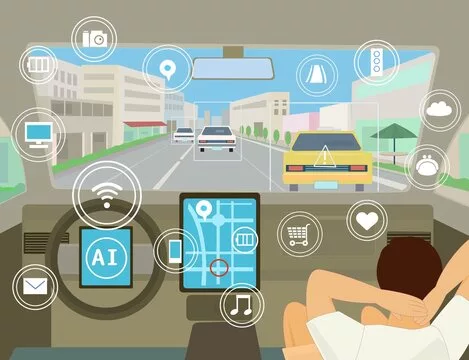In recent years, artificial intelligence has become a hot topic. From self-driving cars to virtual assistants, AI is changing the way we live. But what effect does it have on our economy? Join us as we explore the AI effect on the economy and examine how its use could shape the future of business.
Understanding the AI Effect on Economic Growth
The impact of artificial intelligence (AI) on economic growth has been a topic of growing interest and debate in recent years, as developers increasingly seek to apply AI to a wide range of tasks. While there are still many unanswered questions about the full extent and consequences of AI’s impact, there is no doubt that it will have an important effect on both the economy as a whole and specific areas such as employment, business, trade, investment, inequality, and poverty.
One oft-stated potential benefit of AI is its potential role in enhancing economic efficiency through automation of routine tasks. By freeing up human resources for more creative or higher value activities, AI could help drive overall economic growth by creating new jobs and expanding production opportunities. In addition, research suggests that widespread deployment of self-learning algorithms could lead to increased productivity levels across all sectors of the market economy. This could lead to significant wage gains for workers within sectors where technology adopters are concentrated (such as information technology), while leaving less-skilled workers worse off. However, there is considerable controversy surrounding the impact of automation on employment levels and future job prospects – with some critics asserting that machines will ultimately displacing large numbers of people from their current occupations altogether.
Another potential long-term boon associated with increasing use of AI is its ability to spur innovation and creativity. By facilitating faster problem solving and generating new ideas outside the mainstream we can better anticipate trends and capitalize on opportunities before they become available to others. The rise in machine learning skillsets over recent years has also raised expectations among some entrepreneurs that artificial intelligence will play an important role in accelerating exponential technological progress – something which so far appears to be holding true in practice. As such, while no one knows exactly how things will play out over the long term it seems likely that high rates of economic growth accompanied by pronounced socio-economic transformation will be one key outcomeof widespread adoption of deep learning technologies across multiple industries over coming decades
The Impact of AI on Job Creation and Unemployment
AI has the potential to drive significant economic growth in both developed and developing economies, particularly in areas such as job creation, increased competitiveness and increased innovation. In fact, some estimates suggest that AI could boost global GDP by up to 35% by 2030.
However, there are also risks associated with the development of AI. These include the potential displacement of jobs, inequality and poverty exacerbation. Hence, the Government must be proactive in implementing policies that mitigate these negative effects while still allowing for the benefits of AI to realize.
For example, governments can promote education and training programmes which help workers adapt to changes brought about by AI. They can also implement measures such as tax breaks or subsidies aimed at encouraging businesses to adopt new technologies. And they can develop regulations that ensure safety standards are maintained while promoting innovation.
Exploring the Potential Benefits of AI on Businesses
The potential benefits of artificial intelligence (A.I.) for businesses are vast, ranging from improved efficiency and productivity to cost savings and increased market share. On the other hand, there are also numerous risks associated with A.I., including unforeseen consequences of deployments, cyberattacks, and uncontrolled proliferation of A.I.-powered machines. In order to mitigate these risks while still fostering growth in the area of A.I., governments around the world must take a number of actions, including promulgating regulations that support innovation while protecting consumers and workers.
One key implementation challenge is balancing the need for open access to data with security concerns around privacy invasion and unauthorized use. Another issue is managing expectations about what sort of capabilities will soon be available through A.I., as well as training workers in new areas such as machine learning so they can take advantage of those innovations when they arrive. And finally, there is an urgent need for research into ethical considerations around artificial intelligence – from developing guidelines for how autonomous robots should interact with people on a daily basis to exploring ways we can ensure that beneficial applications of AI don’t turn into undesirable outcomes such as widespread job automation or large-scale economic inequality
Examining the Impact of AI on Global Trade and Investment
Exploring the Benefits of AI in Global Trade and Investment
AI is poised to have a significant impact on global trade and investment. Allerdings, there are many questions about how this technology will actually be used, its potential benefits, and the ways in which it will affect businesses and economies around the world. In this section, we explore some of these issues.
How Will AI Impact Global Trade?
One of the most immediate impacts of AI on global trade is its ability to automate processes and tasks that currently require human input. For example, self-driving cars can ride freight trains autonomously, meaning fewer accidents and less time spent looking for parking spaces. By taking out human error from the equation, this could lead to important efficiency savings for companies shipping goods around the globe. In addition to reducing costs, AI could provide new opportunities for businesses to export their products to new markets. For example, a shipping company might use AI to identify potential customers in distant countries who are interested in purchasing particular items.
AI also has the potential to improve the accuracy and quality of trade data. For years, analysts have struggled to accurately predict global economic trends due to a lack of reliable data. With AI assistance, however, this could change significantly. The technology can help analysts better understand how customers across different industries perform and determine which products and services should be exported more aggressively. Moreover, AI could help reduce the time it takes customs officials to process shipments and make sure that all taxes are paid on imported goods.
What Are the Benefits of AI for Businesses?
For businesses, AI has the potential to reduce costs and improve efficiency. For example, self-driving trucks could use satellite imagery to avoid accidents on highways, reducing both the number of crashes and damage done. Darüber hinaus kann AI automate processes that are currently performed by humans. For example, it can help companies manage customer data more effectively by identifying interactions that require human discretion (such as whether a customer is likely to re-purchase a product). Moreover, AI technology can be used to develop new products and services in ways previously impossible. Alternatively, autonomous cars could be programmed to anticipate problems on roadways and provide recommendations for how best to navigate them.
How Will AI Impact Global Investment?
AI also has the potential to improve the accuracy and quality of investment data. For years, analysts have struggled to accurately predict global economic trends due to a lack of reliable data. With AI assistance, however, this could change significantly. The technology can help analysts better understand how customers across different industries perform and determine which products and services should be exported more aggressively. Additionally, AI could help reduce the time it takes for financial experts to make informed investment decisions.”
Assessing Challenges to Leveraging Artificial Intelligence in International Business
AI has the potential to improve global trade and investment by automating processes and making decisions more efficiently. However, there are several challenges to leveraging AI in international business. First, AI is still in its early stages of development, and there is a lot of room for improvement. Second, AI can be difficult to implement and scale, which can lead to disruptions in business operations. Third, AI can be biased and inaccurate, which can lead to unintended consequences. Fourth, when it comes to using AI in business, privacy concerns often raised, which can impede its adoption. Finally, many companies are still not aware of the benefits of AI and are hesitant to invest in it due to these challenges.
Looking at Examples of AI-Driven Economic Growth Across Different Industries
A number of challenges must overcome before this can happen. First and foremost, AI technology needs to become more sophisticated and able to understand complex business processes. Additionally, companies need to invest in infrastructure such as data analytics and machine learning capabilities in order to make best use of AI. Finally, countries need to make sure their regulatory framework is conducive to the adoption of AI-driven technologies.
Despite these challenges, there are already several examples of how AI has boosted economic growth across different industries. For example, retail giant Walmart has made significant use of artificial intelligence for its automated customer service lines. This has helped the company reduce its staff costs and improve customer service. In the healthcare sector, AI has been used to improve the accuracy of medical diagnoses and to help doctors make better treatment decisions. AI has also been used to improve the efficiency of transportation systems, such as in ride-sharing services.
Insgesamt, there are many potential benefits to gain from the widespread adoption of AI. However, it will take a concerted effort by all stakeholders to make this happen.
Considering the Possibilities for Future Advancements In AI Technology And Its Impact On The Economy
AI and its implementing technologies hold the potential to redefine global trade and investment patterns in ways that are both beneficial and disruptive. Predictive modeling, machine learning, and artificial intelligence offer unprecedented capabilities for businesses of all sizes to manage resources more efficiently, identify new opportunities early on, and predict future outcomes. In this regard, AI has already had a significant impact on various industries including transportation, banking, healthcare, retail sales, manufacturing supply chains, tourism planning/reservation systems (VRS), food inspection safety etc.
Some experts suggest that AI may eventually result in an “unprecedented level of global economic integration” through increased efficiency in cross-border commerce as well as the facilitation of trade between countries with differing regulatory regimes or cultural norms. Others caution that the rapid adoption of AI may also create new opportunities for cyber-attacks and other forms of cyber-crime, and could lead to widespread job displacement.
Nevertheless, there is no doubt that AI has the potential to profoundly impact global trade and investment patterns in ways that are both beneficial and disruptive. In order to maximize the potential benefits of AI, it is important to understand the various ways in which it can be used to improve business operations. In addition, it is essential to ensure that regulatory frameworks are in place to manage potential risks associated with its widespread adoption.
Assessing the Impact of AI on Inequality and Poverty
There is a lot of excitement surrounding artificial intelligence these days, and for good reason. Developed over the last few decades, AI has the potential to revolutionize an entire range of industries and create new opportunities for both individuals and businesses. Cependant, there are also a number of potential negative impacts that need to be considered before implementing this technology into mainstream economies. In this section, we will explore some of the most significant risks and how governments can best mitigate them.
One key risk is that AI could lead to mass job automation. As machines become increasingly capable at performing tasks once carried out by humans, there may be a large number of people who find their jobs eliminated completely. This could have a significant impact on labor markets and overall economic growth, especially if it leads to widespread unemployment.
Another worry is that AI could lead to increased inequality between different income groups, as the wealthy will likely benefit disproportionately from its benefits while low-income individuals may lose out altogether. To date, however, there has been limited evidence that this actually happens in practice. Nonetheless, governments should take measures to protect vulnerable groups from such consequences if they do prove true in future years.
Finally, AI has the potential to cause major financial crises due to its ability to automate complex financial processes (such as portfolio management). If automated systems make recommendations that are not rational or prudent – or worse still – if they go wrong – then this could trigger widespread market turmoil. Again, governments will need to play an important role in ensuring that no such incidents occur and damage is minimalized as much as possible.
Investigating the Potential Risks of AI to Financial Markets
There are a number of potential risks associated with the development and use of artificial intelligence (AI). One risk relates to the misuse of AI technology by criminal organizations or hackers, who could exploit it for malicious purposes. Additionally, AI could cause significant disruptions in various sectors, such as finance, manufacturing, and healthcare. At present, there is limited understanding of the full range of potential consequences of widespread deployment of AI. Consequently, it is difficult to assess the extent to which any given risk might materialize or how best to address it.
Governments around the world are currently undertaking a number of initiatives aimed at mitigating some of these risks. For example, regulators are working on rules that would allow companies to disclose more about how their products are using AI. In addition, governments are also exploring ways to fund research into areas such as ethical governance and learning algorithms that can operate safely and responsibly in complex environments. It will be important for policymakers to continue taking these steps in order to ensure that society benefits from the long-term potential benefits associated with widespread deployment of AI technologies.
Examining the Role of Government in Regulating AI-driven Economic Activity
There is no doubt that artificial intelligence (AI) has the potential to dramatically reshape the global economy. However, it is important to understand just how AI will impact different aspects of economic activity – and to develop appropriate policies and strategies to manage any risks or negative consequences. In this section, we provide an overview of some of the most important impacts of AI on the economy, including job creation and unemployment, business growth and investment, inequality and poverty, financial stability, consumer spending and investment decisions, tax rates and structures, and government activities.
First things first: in terms of jobs losses overall, there will undoubtedly be some – but it’s still too early to say exactly how many. One study by PwC predicts that up to 47% of all current employment could be automated over time . But even if something similar but better paid replaced every single job lost due to automation there would still be substantial reductions in overall employment levels. So while the rise of AI may cause significant upheaval in certain sectors at first blush, it’s important not to exaggerate its overall impact on our economies as a whole.
That said, there are a number of areas where AI could have far more profound effects than others. For example:
The explosive growth in data processing capacity resulting from advances in big data analytics has given rise to what economists call “the Fourth Industrial Revolution.” This revolution involves the application of algorithms – which are procedures or programs designed specifically for carrying out specific tasks – across multiple industries via sophisticated computer systems rather than individual workers . And thanks largely to advances in machine learning (i.e.,AI), this kind sequencing can now be performed with increasing accuracy at lightning speed . As such, AI has enormous potential not just for automating basic operations within businesses but also for accelerating innovation cycles by enabling companies to explore new ideas faster and test them before scaling them up into full production . In theory at least – assuming companies can find qualified employees who can operate these increasingly complex machines!
But while automating routine work functions may initially reduce staff numbers considerably (and lead those left behind into lower-paying roles), other potential benefits include increased productivity due to streamlined processes; reduced reliance on human resources; enhanced customer service through improved interaction between humans and machines; wider adoption of new technologies (since businesses don’t have as much invested in training their employees to use these new tools); and the possibility of starting up businesses with little initial investment or even no human capital at all .
Due to these myriad potential benefits, it’s not surprising that many commentators see AI as having enormous potential for job creation – and potentially even doing more to reduce unemployment than traditional economic policies . In fact, some experts are even predicting that AI could actually be responsible for reducing overall employment levels by as much as one-third over the next few decades ! Of course, this is still very much an emerging trend so it’s impossible to say for certain how things will play out. But if history is any guide, we can expect continued disruption and a rapid shift in jobs towards areas where AI has the most impact.
Another important area where AI may have significant implications is business growth and investment. For example:
Machine learning algorithms already being used to accelerate decision making across a range of industries, from banking to healthcare . As such, companies using AI technology can now make faster decisions about which products and services to offer; reduce risk by exploiting data asymmetries (i.e.,information that one party has but the other does not); identify new market opportunities; optimize production processes; and forecast future demand . In theory at least – assuming those in charge of implementing these strategies have the skills required to do so!
Of course, there are also numerous risks associated with deploying this kind of technology indiscriminately. Not unlike humans themselves (who make mistakes), machines don’t always accurately predict outcomes or take into account all available information when making decisions. This could lead to costly errors or vulnerabilities that hackers could exploit in order to gain access to company systems or steal valuable data [10]. So while machine learning appears capable of delivering huge benefits on paper, it’s essential that developers rigorously test their algorithms before deploying them in live operations – otherwise they run the risk of introducing unforeseen complications (and costly disruptions) into businesses’ operations.
Overall then, while there remains considerable uncertainty around just how large an impact AI will ultimately have on economies around the world, there is no doubt that it poses serious risks as well as potential rewards. And as policymakers begin grappling with how best handle these challenges, it will be important to keep pace with ongoing developments in this rapidly evolving field.
Understanding the Impact of AI on Consumer Spending and Investment Decisions
Examining AI and the Impact on Consumer Spending
AI has the potential to profoundly change the way we live and work, but it will also have an impact on consumer spending and investment decisions. In this section, we will explore the ways in which AI will affect these areas, and how businesses can prepare for the changes.
AI has the potential to dramatically change the way we live and work. For example, it could help us drive more efficient and effective decisions in our businesses, or even help us learn new skills more quickly. However, AI also has the potential to change how we spend our money and invest our resources.
In this section, we will explore how AI is likely to impact consumer spending and investment decisions. We will start by examining how AI is likely to change the way we make purchasing decisions. AI has the potential to help us identify products that are both useful and affordable, and it can even help us save money on our shopping experiences.
We will next explore how AI is likely to impact investment decisions. As we mentioned earlier, AI could play an important role in helping us choose investments that are both prudent and profitable. In addition, AI has the potential to improve our understanding of financial markets – making it easier for us to make informed investment choices.
Exploring How AI Impacts Investment Decision Making
AI has the potential to profoundly impact consumer spending and investment decisions, as well as the overall economy. By automating decision-making processes, AI could reduce the amount of time and effort required to make informed choices. In addition, AI could help improve the accuracy and timeliness of information, which could lead to more informed and efficient investment decisions.
While there are many potential benefits of AI-driven decision making, there are also some potential risks. If AI is used to make decisions that are biased or inaccurate, this could have a negative impact on the economy. Moreover, if AI is used to automate processes that are currently handled by humans, this could lead to a loss of jobs.
Overall, it is still too early to determine the full impact of AI on consumer spending and investment decisions. However, by understanding the potential impacts and exploring how AI is affecting different areas of decision making, we can begin to better understand the implications of this technology.
Analyzing Potential Economic Effects of Artificial Intelligence
The widespread adoption of artificial intelligence (AI) has the potential to profoundly impact both consumer spending and investment decisions. In this article, we explore how AI could impact consumer spending and investment decisions.
First, let’s take a look at how AI could impact consumer spending. With AI-powered automation, businesses could reduce the need for human workers, thereby reducing costs associated with hiring and training new employees. As a result, consumers could save money on their wages and benefits. Additionally, AI-powered automation could lead to increased efficiency in businesses, which would result in lower prices for goods and services.
On the other hand, AI could also have negative impacts on consumer spending. For example, if businesses replaced human workers with AI-powered automation, consumers could lose out on important job opportunities. In addition, AI-powered automation might lead to increased inequality, as some workers would lose income while others maintain their positions.
Now that we have an understanding of how AI could impact consumer spending and investment decisions, let’s take a look at how AI could impact investment decisions. With the widespread adoption of AI-powered automation, businesses could reduce the need for human investors and traders. As a result, investors and traders could save money on their transaction costs and earn higher returns on their investments. Additionally, AI-powered automation might lead to increased efficiency in businesses, which would result in lower prices for goods and services.
On the other hand, AI might also have negative impacts on investment decisions. For example, if businesses replaced human investors and traders with AI-powered automation, investors and traders could lose out on important opportunities. In addition, AI-powered automation might lead to increased inequality, as some investors and traders would lose income while others maintain their positions.
Overall, the widespread adoption of AI has the potential to profoundly impact both consumer spending and investment decisions. However, the impacts of AI on these two areas are complex and uncertain. As a result, businesses and policymakers will need to carefully consider the potential economic effects of AI before making decisions.
Assessing the Long-Term Impact of AI on the Economy
Since the launch of artificial intelligence (AI) technologies in the late 20th century, economists and businesses have been grappling with questions about their potential economic impacts. In this section, we will explore how AI may impact consumer spending and investment decisions.
Consumer Spending:
A large body of research suggests that AI has the potential to increase productivity in various sectors of the economy, driving down prices and improving quality across a wide range of goods and services. As a result, individuals are likely to spend more on goods and services overall as a result of increased automation. However, some experts argue that there could also be significant downside risks associated with future advances in AI technology – such as widespread unemployment or increased inequality – which could reduce spending levels significantly.
As mentioned earlier, AI technologies have the potential to improve productivity and drive down prices across a wide range of goods and services. This could lead to increased investment in these sectors, which would in turn support economic growth over time. However, there are also concerns that widespread automation may result in mass unemployment, particularly among low-skilled workers. If this happens, it may lead to decreased spending levels and slower economic growth. It is important to note that while the long-term impact of AI on the economy remains largely uncertain, studies suggest that both positive and negative consequences will likely occur over time.
Exploring the Impact of AI on Taxation Policies and Structures
Currently studying and debated the impact of artificial intelligence (AI) on economic growth, but there are a few key points that generally agree upon. For one, AI has the potential to increase productivity and innovation, which could lead to increased economic growth. Additionally, AI could also help to reduce the amount of time needed to complete certain tasks, which could lead to increased efficiency and productivity. Finally, AI could also help to reduce the amount of human labor required for certain tasks, which could lead to increased employment opportunities.
While there are many potential benefits of AI on the economy, there are also some potential risks. If AI is used to automate jobs or reduce the need for human labor, this could lead to a decline in employment opportunities and inequality. Moreover, if AI is used to manipulate financial markets or deceive consumers, this could have negative consequences for the economy.
It is still too early to say for sure how the impact of AI will play out over the long term, but it is important that policymakers and businesses continue to study the issue in order to make informed decisions about how best to use this technology.
Evaluating the Effectiveness of Policies Aimed at Mitigating Negative Impacts of AI
In this section, we will evaluate the effectiveness of policies aimed at mitigating negative impacts of AI. We will look at a few key examples, and discuss the pros and cons of each.
One key policy area is regulation. Governments have the responsibility to ensure that AI is used safely and responsibly, and to protect the public from potential harms. However, some argue that excessive regulation could stifle innovation and impede economic growth.
Another key area is education. We need to make sure that everyone has the knowledge and skills necessary to use AI safely and effectively. This includes teaching children about the risks and benefits of AI, as well as how to code and program.
Finally, we need to make sure that we have enough resources to deal with the impacts of AI. This includes funding for research into new ways to use AI safely and responsibly, as well as for retraining workers who may be affected by AI-driven changes in the economy.
The AI effect on the economy is a complex and multi-faceted phenomenon that will continue to evolve as technology advances. AI can bring many benefits to businesses, workers, and consumers, but also carries certain risks that must be addressed. It is clear that governments must play an active role in regulating AI-driven economic activity and in mitigating any potential negative impacts. Ultimately, understanding the implications of AI on the economy requires an ongoing effort to stay informed about developments in this rapidly changing field.
At [Your Website], we strive to provide our readers with the latest insights into how AI is transforming the economy. Be sure to check out our other content for more information on this important topic.






